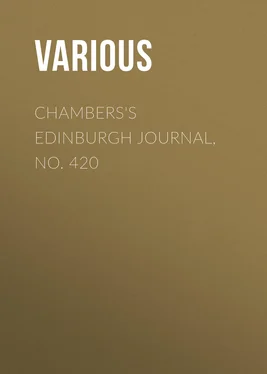One of the first principles of education in the orphan schools of the Sisters of Charity is economy: while they spare nothing in the cause of humanity, so far as their means will go, the strictest frugality reigns throughout, and is always inculcated as the foundation of the means of doing good. Consequently, all of whom we have had any experience, who were educated in these charitable institutions, never failed, however humble their situation, to make some little savings: one whom we have at this moment in our eye, and who not many years since served us in the capacity of cook, and fulfilled her charge with great fidelity and zeal, has, by her extraordinary industry and economy, collected in the savings' bank in Prague no less than 700 florins, or L.70 sterling. And yet with all this economy she was so charitable and liberal in giving of her own to the poor, that we have often had to caution her against extravagance in that respect. By this spirit of economy, we have also known several of the orphans and foundlings arrive at a degree of independence which enables them in their turn to assist the deserted generation of to-day, and to do for them as they themselves had been done by. Many also have been the means of rescuing others from crime and starvation by conducting them to that blessed institution, to which, under Heaven, they owe all their prosperity and happiness in life.
Of these charitable communities there are many orders, which differ from the above chiefly in name, and in the Sisters never quitting their sanctuary or the precincts of their gardens. The Sisters of Charity, properly so called, not being vowed to seclusion, are more generally known to the world, who see them, and therefore believe that they exist for charitable purposes, while of those of whom they see nothing they know nothing; and should the casual observer meet in the street on a festival, or day of examination, a column of from 300 to 800 children, from six to ten or twelve years of age, neatly clothed, and whose happy countenances and beautiful behaviour bespeak the care with which their early education has been conducted—it never once occurs to him that these are the children of the poor, the children of the free schools of the 'Sisters' of the Ursaline Convent, or of the Congregation of Notre Dame, or of some other religious establishment of the kind. But perhaps we shall have an opportunity hereafter of introducing these invisible Sisters of Charity to the notice of our readers.
Suffice it now to say, that the 'Sisters of Mercy,' the 'Ursalines,' the 'Congregations of Notre Dame,' the 'English Ladies,' and many others, are all in practice Sisters of Charity.
It is not uncommon to hear their condition deplored, as one from which all earthly enjoyments are excluded, or as a kind of death in life. But personal observation has given us different ideas on this subject. Within those lofty, and sometimes sullen-looking walls which enclose the convents of the sisterhoods we speak of, we have spent some of the most agreeable hours of our life, conversing with refined and enlightened women on the works of beneficence in which they were engaged; everything bearing an aspect of that cheerfulness and animation which only can be expected in places where worthy duties are well performed.
ADVENTURES OF AN ARMY PHYSICIAN
Robert Jackson, the son of a small landed proprietor of limited income hut respectable character in Lanarkshire, was born in 1750, at Stonebyres, in that county. He received his education first at the barony school of Wandon, and afterwards under the care of Mr Wilson, a teacher of considerable local celebrity at Crawford, one of the wildest spots in the Southern Highlands. He was subsequently apprenticed to Mr William Baillie, of Biggar; and in 1766 proceeded, for the completion of his professional training, to the university of Edinburgh, at that time illustrated and adorned by the genius and learning of such men as the Monros, the Cullens, and the Blacks.
In pursuing his studies at this favoured abode of science and literature, young Jackson is said to have evinced all that purity of morals and singleness of heart which characterised him in after-life, and to have resisted the allurements of dissipation by which, in those days especially, the youthful student was tempted to wander from the paths of virtuous industry. His circumstances were, however, distressingly narrow; and not only was he forced to forego the means of professional improvement open only to the more opulent student; but in order to meet the expenses of the winter-sessions, he was obliged to employ the summer, not in the study but in the practice of his profession. He engaged himself as medical officer to a Greenland whaler, and in two successive summers visited, in that capacity, 'the thrilling regions of thick-ribbed ice;' returning on each occasion with a recruited purse and a frame strengthened and invigorated by exposure and exercise. During these expeditions he occupied his leisure with the study of the Greek and Roman languages, and the careful and repeated perusal of the best authors in both.
Конец ознакомительного фрагмента.
Текст предоставлен ООО «ЛитРес».
Прочитайте эту книгу целиком, на ЛитРес.
Безопасно оплатить книгу можно банковской картой Visa, MasterCard, Maestro, со счета мобильного телефона, с платежного терминала, в салоне МТС или Связной, через PayPal, WebMoney, Яндекс.Деньги, QIWI Кошелек, бонусными картами или другим удобным Вам способом.
The upper and under plates of the tortoise are so called by naturalists.
